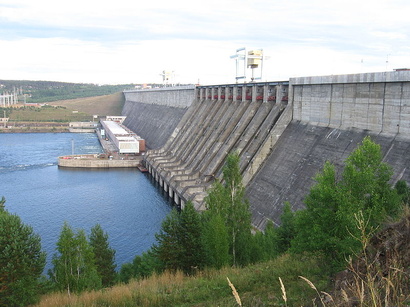Tajikistan to continue with Rogun HPP project, expert believes

By Aynur Jafarova
Tajikistan is likely to continue with the project of construction of the Rogun Hydro Power Plant (HPP) even if the World Bank (WB) decides that its impact may be harmful, U.S. expert on Central Asia Bruce Pannier believes.
Saroj Kumar Jha, the WB Regional Director for Central Asia was in Tajikistan in February to negotiate about the Rogun dam with Tajik officials.
According to the expert, Jha stressed that the parties directly involved in this issue will decide whether to build or not build the dam.
WB is about to say the project doesn't present harmful impact to Tajikistan or its downstream neighbors, such as Uzbekistan, the expert told Trend news agency on September 24.
If the report unexpectedly finds that the project is unfeasible or unsafe that would be a heavy blow to Tajik President Emomali Rahmon and his government, he added.
"Rahmon has been holding up Rogun as a sign of national pride and a way of breaking dependence on natural gas imports from Uzbekistan," Pannier said. "Tashkent has often shown its displeasure with Tajik government's decisions by reducing or totally cutting off gas supplies to Tajikistan, which account for some 90 percent of Tajikistan's gas."
"I think Rahmon would still try to go ahead with the project even if the WB report advises against it," he added.
In late 2009 and 2010 there was a huge campaign in Tajikistan to donate money toward the construction of the Rogun HPP. Almost everyone had to contribute some of their wages and in return they received shares in the project. Media reported some $180 million worth of shares in the project had been sold before summer 2010.
"Still, if Rahmon announced the project was cancelled, it would mean giving back at least part of that $180 million to citizens who bought shares and the Tajik government does not have $180 million to spare for that," Pannier believes.
The preliminary report of the WB on the ecological expertise of the Rogun HPP is expected to be published in late September.
The construction of the Rogun HPP is not easy. Tajikistan faces economic and political obstacles of neighboring countries, in particular, Uzbekistan, with which Tajikistan has problematic relations. Another problem is how to finance the construction of the Rogun HPP, the cost of which is estimated at as much as $2.2 billion.
The Rogun HPP is seen in Tajikistan as a solution to the energy independence and a tool for economic growth. If the project is implemented, Tajikistan will be able to generate about 13 billion kilowatt-hours of electricity annually. This will not only help the country to meet its domestic needs but will also make Tajikistan a major exporter of electricity.
Disputes over the construction of the Rogun HPP further complicated the strained relations between Tajikistan and Uzbekistan.
The economy of Uzbekistan is heavily dependent on agriculture. Tashkent argues that the formation of a giant reservoir behind the Rogun Dam would affect the flow of water to its cotton fields.
One of the main issues pertaining to the construction of the Rogun HPP is its impact on the environment of the region.
There are contradictory evaluations on the matter. Several experts believe that the Rogun HPP will cause disasters while others argue that there is no such possibility.
The Uzbek authorities say that the massive dam would have an adverse environmental impact and induce higher scale earthquakes in an already seismically active area. According to Uzbek experts, a large earthquake would destroy the Rogun Dam and tens of cities in Tajikistan, Afghanistan, Uzbekistan and Turkmenistan would be flooded.
Here we are to serve you with news right now. It does not cost much, but worth your attention.
Choose to support open, independent, quality journalism and subscribe on a monthly basis.
By subscribing to our online newspaper, you can have full digital access to all news, analysis, and much more.
You can also follow AzerNEWS on Twitter @AzerNewsAz or Facebook @AzerNewsNewspaper
Thank you!
